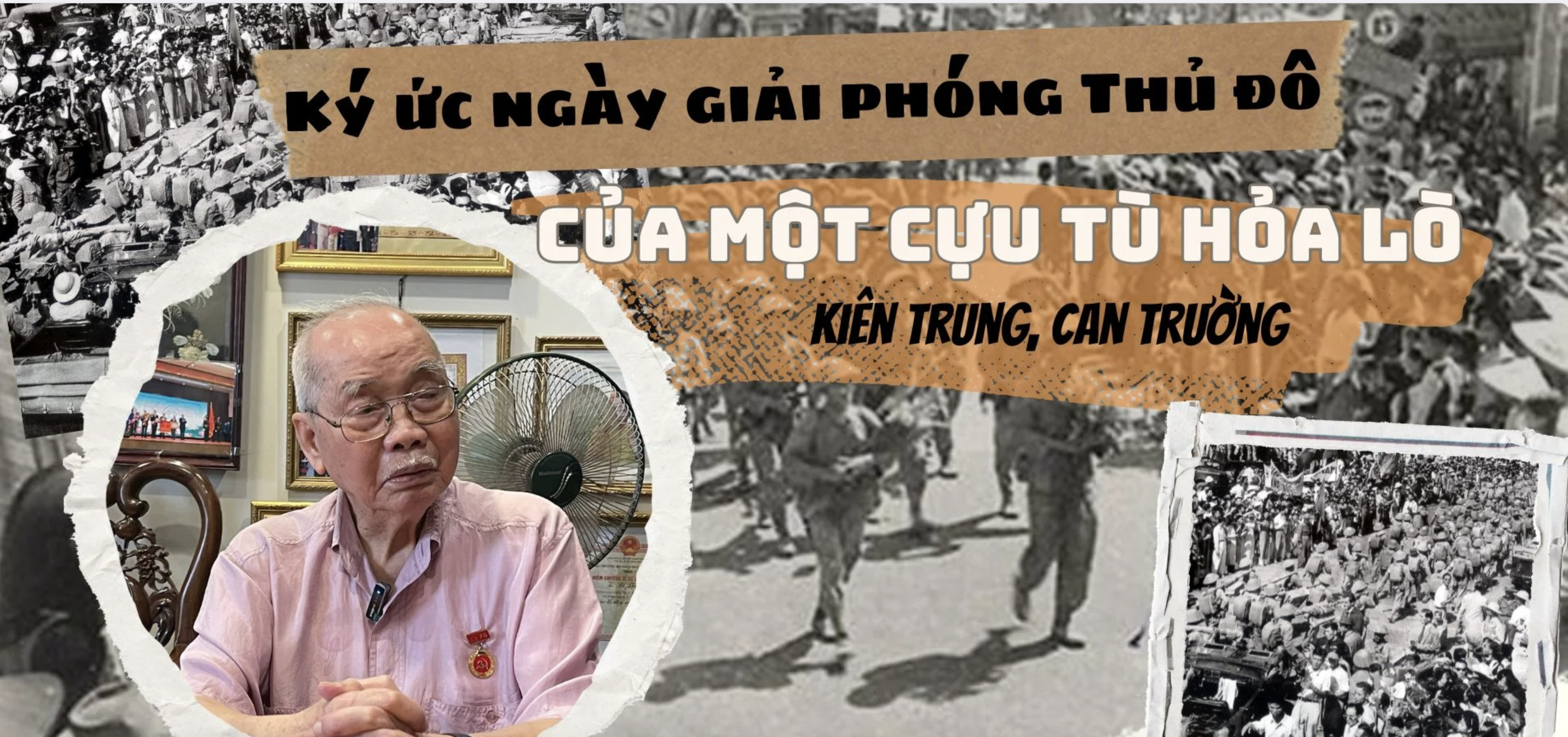


O Cau Den rampart in the resistance war against French colonialism was the decisive battle point of the army and people of Inter-zone II, located on the three-gate defense line: Dong Mac-Cau Den-Dong Lam in the Southeast of Hanoi. During the outbreak of the nationwide resistance war, young man Nguyen Tien Ha volunteered to join the Vietnam People's Army, participating in the Hanoi military front (the predecessor of the current Capital Military Zone), and fought bravely with his comrades for 60 days and nights to protect the capital at the O Cau Den front.
After 21 days and nights of fierce attacks, the entire defensive line of our city gates still stood firm. On January 15, 1947, the enemy accepted defeat and had to change direction of attack, hoping to continue to carry out the plan that the fierce bombardment had failed to achieve at the city gates. The army forces were ordered to withdraw to the free zones in the areas of Quoc Oai, Son Tay, Chuong My, My Duc... to preserve their forces for the long-term resistance war.
In 1946-1949, we advocated sending forces to fight secretly in the inner city to build a base. The superiors set out criteria for selecting cadres to work in the inner city, who must be from Hanoi , have passed the test of hardship and are trustworthy. The young man Nguyen Tien Ha was entrusted with this task, secretly entering the inner city, in charge of Truc Bach area (equivalent to Cau Giay and Ba Dinh districts today).
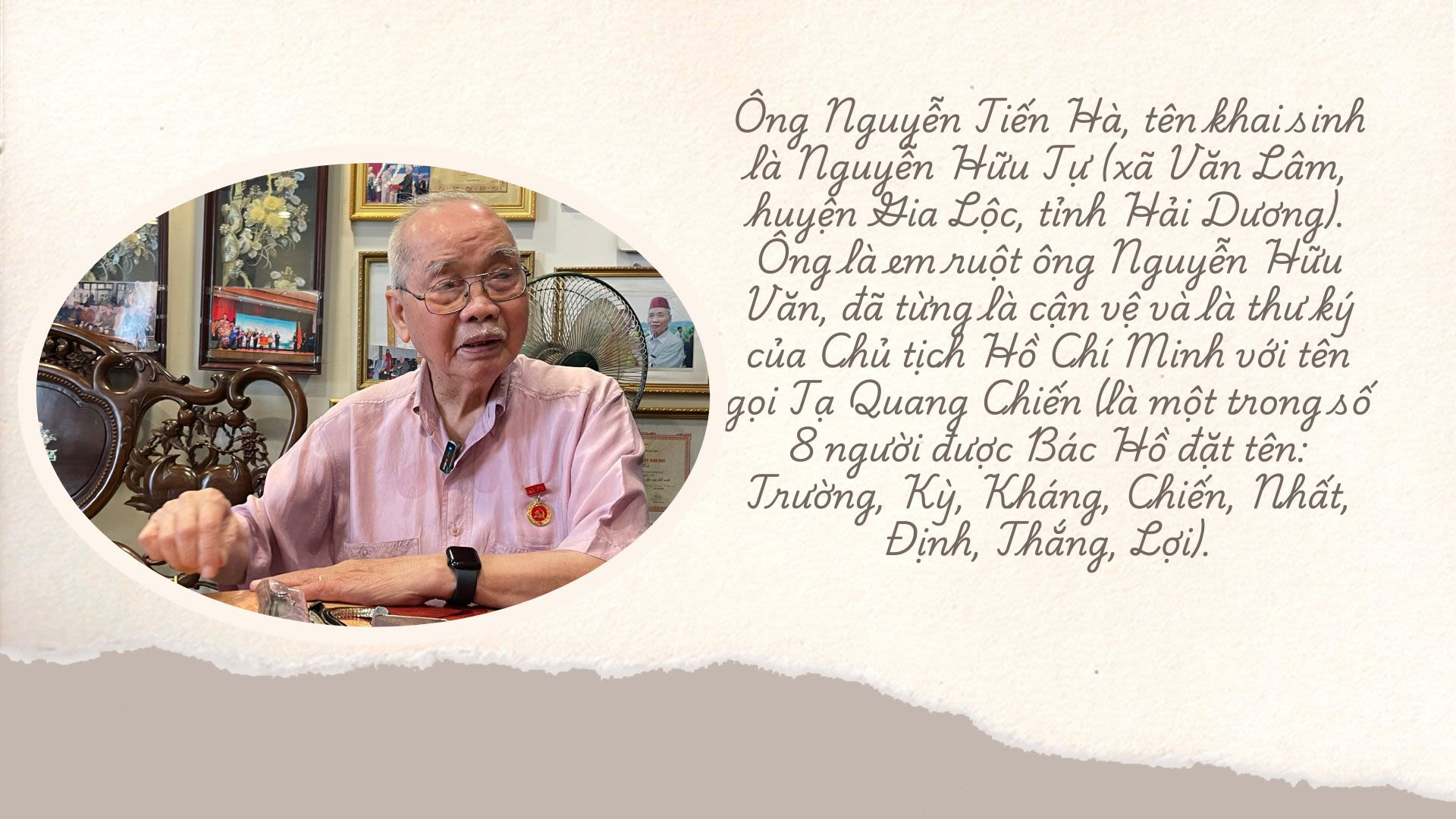 He carried out the task of propagating the policy of “long-term resistance, certain victory” to enlighten the people on the path of resistance. “In the 1950s, we had to gather patriotic forces and prepare everything, so that when we counterattacked, there would be a supporting force inside, fighting from the inside out, fighting from the outside in,” Mr. Ha raised his fists in the air, recalling the determination of his youthful days.
He carried out the task of propagating the policy of “long-term resistance, certain victory” to enlighten the people on the path of resistance. “In the 1950s, we had to gather patriotic forces and prepare everything, so that when we counterattacked, there would be a supporting force inside, fighting from the inside out, fighting from the outside in,” Mr. Ha raised his fists in the air, recalling the determination of his youthful days. 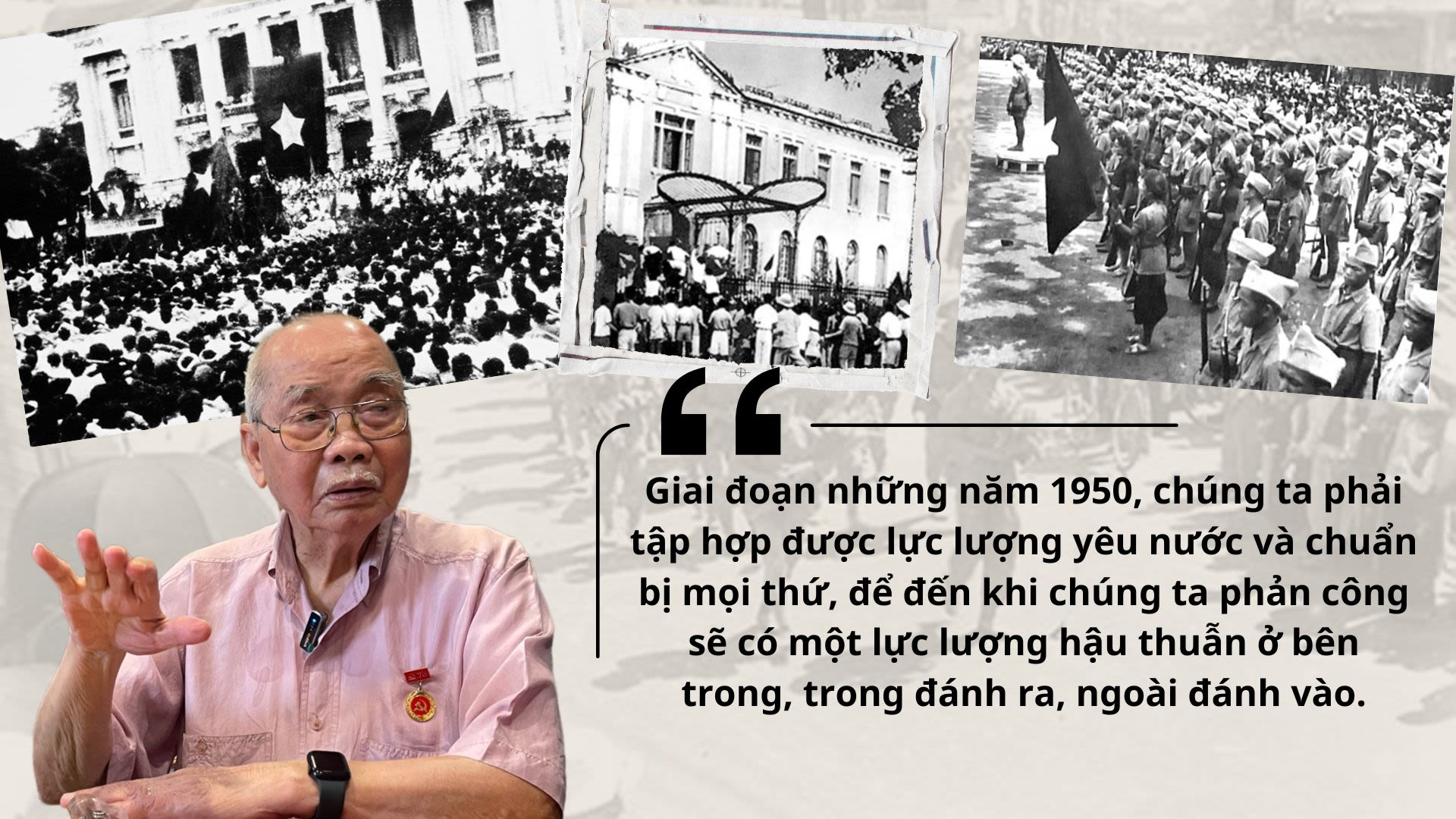
Operating in the enemy's heartland, he and his teammates did a number of things such as destroying the power transmission booth (transformer station) of Hanoi, causing a power outage in the Hanoi area; mobilizing people to destroy the gate to welcome Bao Dai; organizing people in breweries, water plants, and power plants to preserve the facilities and protect their cadre lines; mobilizing students to fight the resistance, mobilizing traders in Dong Xuan and Bac Qua markets...
In addition, Mr. Ha also mobilized doctors and nurses in hospitals to provide our forces with medicine to send outside. Through the Don Thuy Hospital, our forces also knew the number of wounded enemy troops. An equally important task was that this secret force also sold resistance bonds to get money to buy weapons and medicine to send to the liberated zone.
At that time, Mr. Ha operated under the cover of a Professor named Tran Huu Thoa, teaching Mathematics, Physics and Chemistry in French, and tutoring children of resistance bases. Under this cover, one of the long-term and essential tasks that Mr. Ha was assigned was to open small classes of less than 10 people to explain revolutionary work.

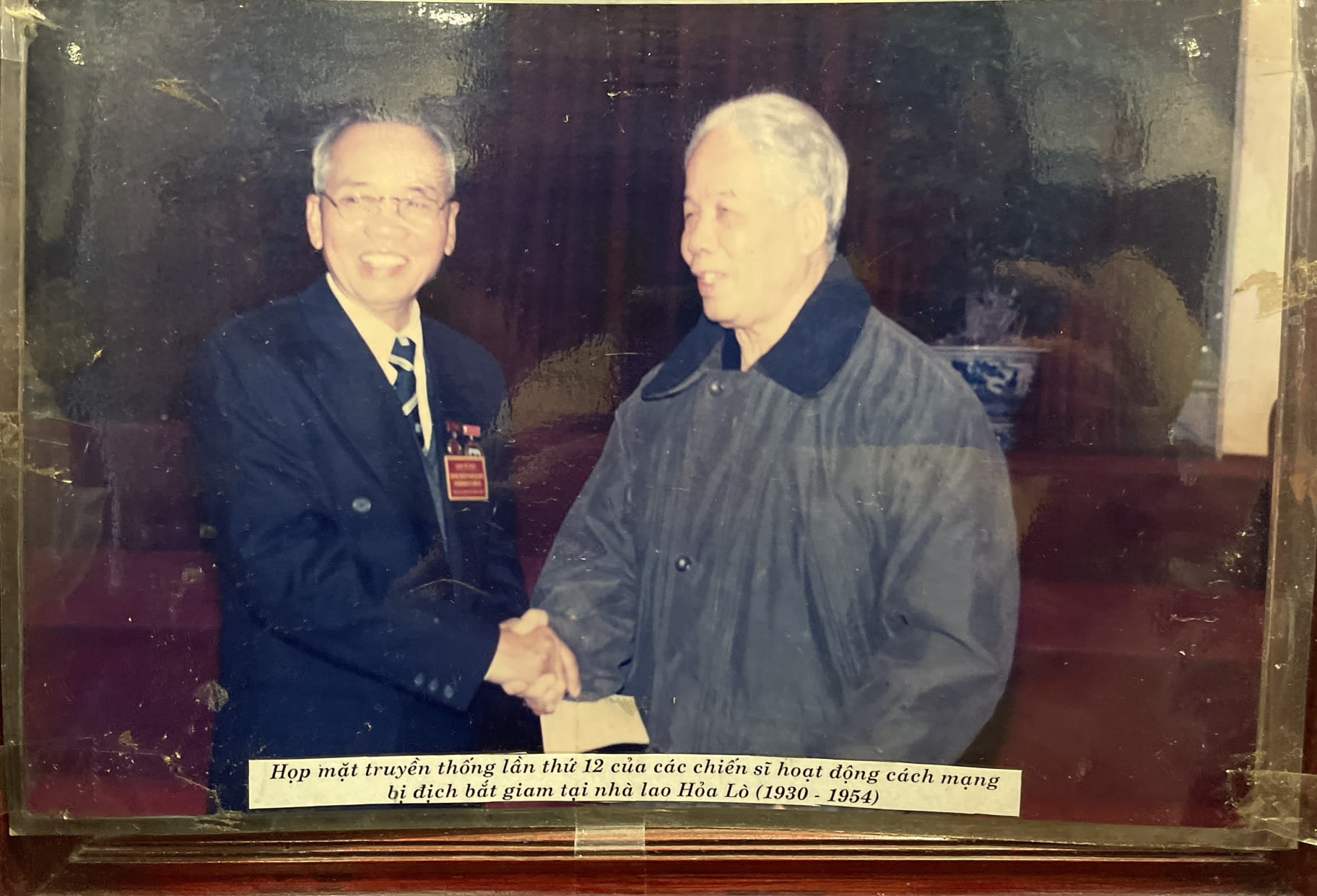
In 1949, Mr. Nguyen Tien Ha was a company officer of the Hanoi City Team, assigned to participate in commanding the rescue of a Hanoi police envoy, comrade Le Nghia (alias Nghia Lo) who was being treated at Phu Doan Hospital (now Viet Duc Friendship Hospital).
After directly investigating and researching the terrain of the medical facility, studying the shift change and guard change times of the enemy's police and soldiers, he made a plan of action. Mr. Ha selected two comrades, one of whom had to be strong enough to carry comrade Nghia; the other had to disarm the police. The plan was prepared down to the last detail, with an insider inside, a medical staff member of ours named Nguyen Thi Chut.
The plan was perfect, comrade Nghia was carried out to Quan Su street and Hoi Vu alley to be handed over to the police, and the job was completed. This incident caused a great stir about the Viet Minh's daring prison break in broad daylight.
Unfortunately, a member of the rescue team later told the story of the prison robbery to the police. The entire rescue team was arrested. They found out that the leader of the prison robbery was a man named Tran Huu Thoa. Mr. Thoa (aka Ha) was caught by them right on Hang Non street, when he had just received documents sent from the free zone. They took him to the District Police and tortured him repeatedly. They used many tricks to force this 22-year-old young man to reveal his organization.
Seeing that they could not get any information out of him, they took him back to the Hanoi Secret Service (now the Hanoi police headquarters). The young soldier was repeatedly beaten, from tying his feet and hanging them from the rafters, repeatedly electrocuting him, to “going underground” (pushing his head into water)… His whole body was numb with pain, but Mr. Ha refused to confess. “I promised the Party and the people that if I confessed, it would be dangerous for the organization and harmful to the people,” Mr. Ha said thoughtfully, then continued: “Being brutally tortured, I was determined to escape from prison.”
Party members who were imprisoned at the Secret Service secretly gathered together to escape from prison. Every day, he poured water on the prison walls to loosen the mortar and bricks, then used nails (secretly sent from the outside) to dig out the joints and remove each brick. He calculated each step carefully, from the need to go to the Federal Secret Service (now the Ministry of Public Security) after leaving the Secret Service, calculating that he had a barrel to climb up the fence, and covering the electrified barbed wire with a blanket. The escape was successful, and he escaped to Lien Tri Alley. The enemy pursued him relentlessly, but thanks to the protection and concealment of the people, he was safe and hiding in the straw bushes to listen.
When they stopped searching, Mr. Ha ran to De La Thanh, went down to Hang Cot to hide in a secret base, and contacted to escape to the free zone. At this time, unfortunately, the traffic officer had just been arrested, and an assistant traffic officer did not know the route, so when it was dawn, before he could pass Highway 6 (located in Du Tien village, Cong Giao commune, now Thanh Oai), Mr. Ha was chased by the puppet soldiers. He ran to the field, but because of the straw and water in the field, his escape was unsuccessful. Mr. Ha was taken to Bao An commune, wrapped on a bench and continued to be tortured. "Luckily, a local person passing by the market took pity on him and gave him a pack of tobacco to chew and swallow to get drunk, so he could endure the beatings," Mr. Ha said.
When he was handed over to the French, he was interrogated: "Where did the Viet Minh come from?", he answered in French: "I am a student, not a resistance fighter. The resistance is hard out there, I went to the inner city to trade." The puppet soldiers were very angry because they could not get any more information from him, so they exposed him to the sun. "At that time, I was both sunstroke and in pain from the torture. Many times I thought I would not survive," Mr. Ha recalled with a shudder.
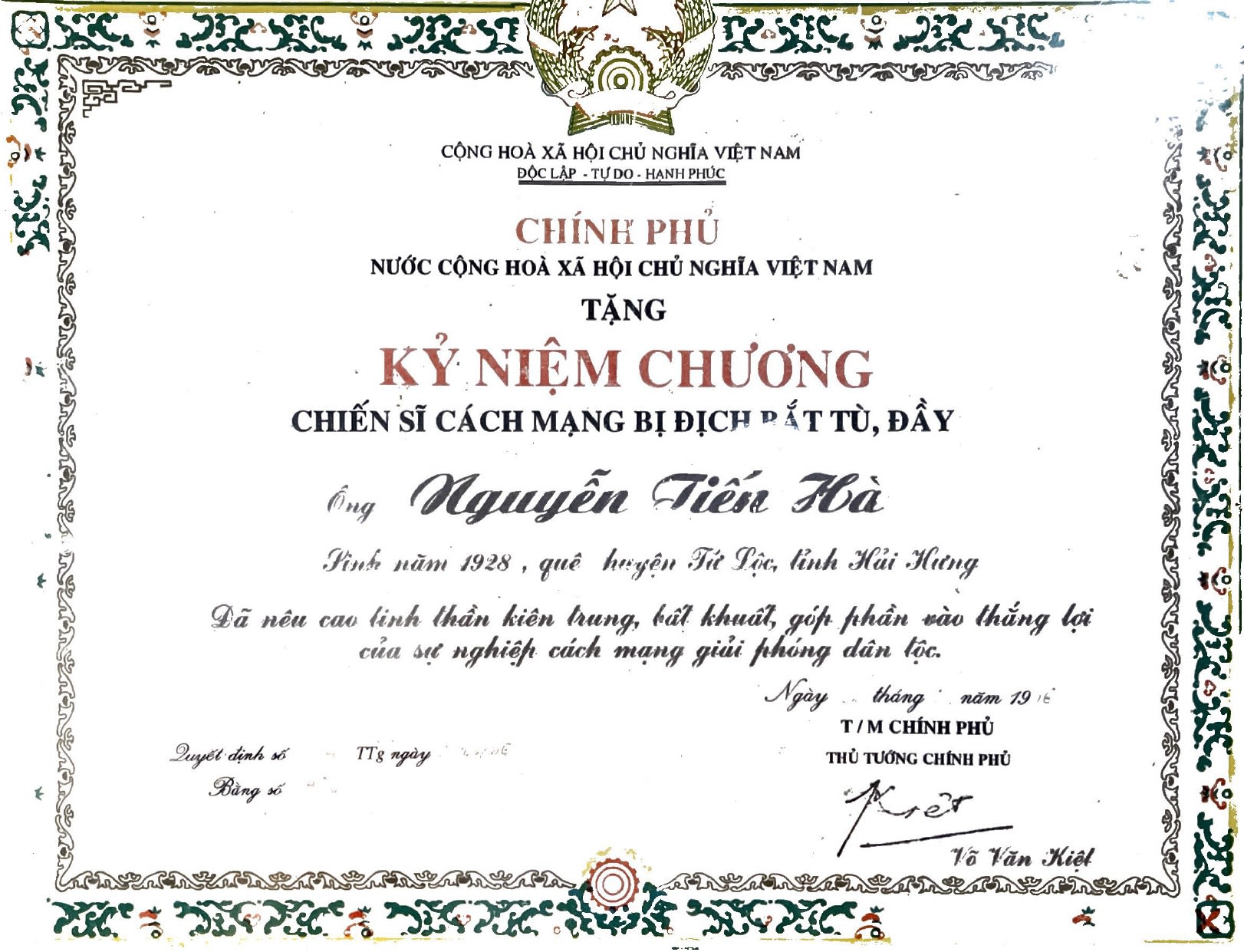
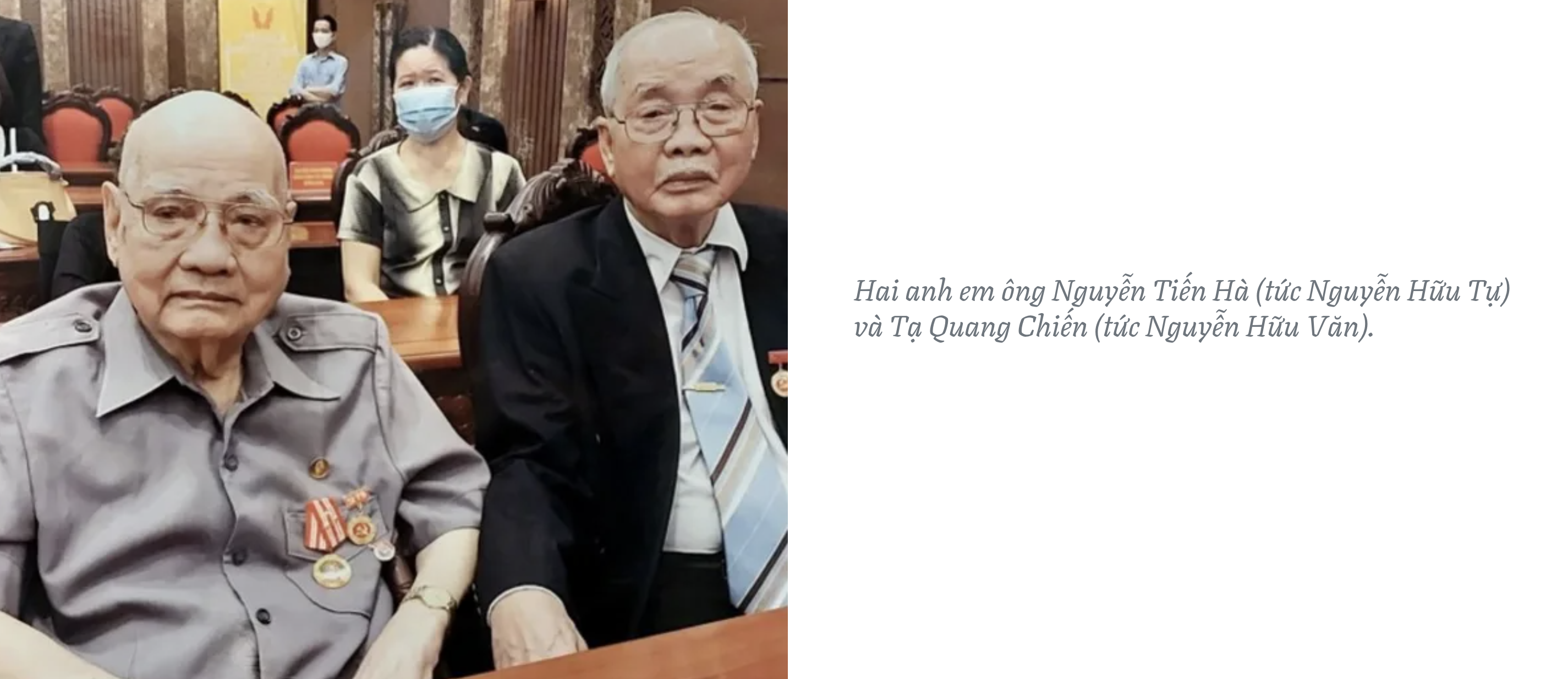
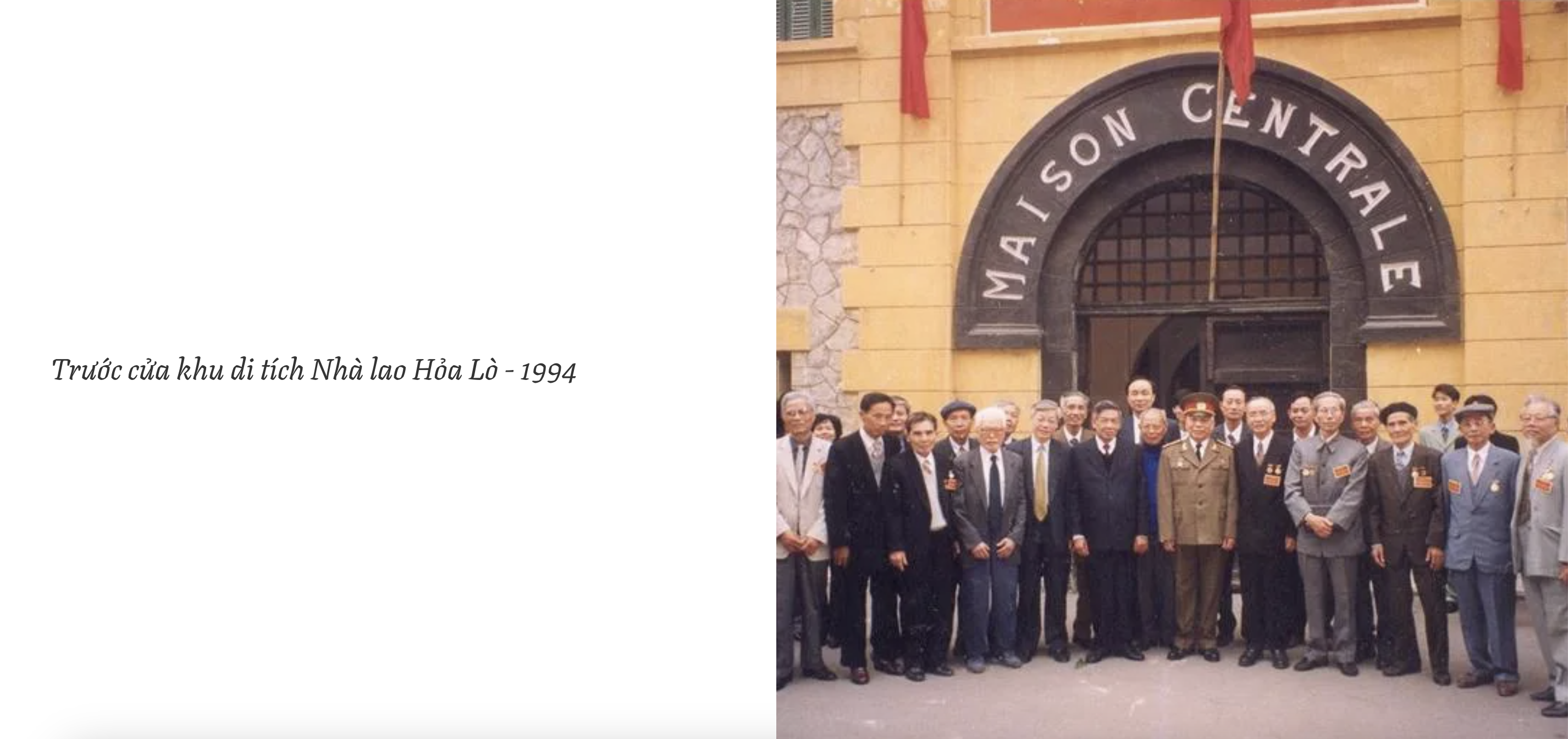
 Looking at Mr. Ha's frail body, the French soldiers carried him to Hoa Lo medical station, hoping that if he died, it would not have anything to do with the Secret Service, avoiding protests and struggles from the inner city movements. Thanks to the care of the medical staff and his comrades, he gradually recovered. Once again, Mr. Ha was taken to the Secret Service to give testimony. At this time, they turned to psychological tricks, luring him. "They brought me cigarettes and milk, tempting me to only reveal one base so I could return to my family, but I firmly refused to reveal. If I revealed that I was robbing a prisoner, I would receive the death penalty. In the end, they had no choice but to accuse me of disturbing public order in the inner city and put me in Hoa Lo prison, awaiting trial," said Mr. Ha.
Looking at Mr. Ha's frail body, the French soldiers carried him to Hoa Lo medical station, hoping that if he died, it would not have anything to do with the Secret Service, avoiding protests and struggles from the inner city movements. Thanks to the care of the medical staff and his comrades, he gradually recovered. Once again, Mr. Ha was taken to the Secret Service to give testimony. At this time, they turned to psychological tricks, luring him. "They brought me cigarettes and milk, tempting me to only reveal one base so I could return to my family, but I firmly refused to reveal. If I revealed that I was robbing a prisoner, I would receive the death penalty. In the end, they had no choice but to accuse me of disturbing public order in the inner city and put me in Hoa Lo prison, awaiting trial," said Mr. Ha. 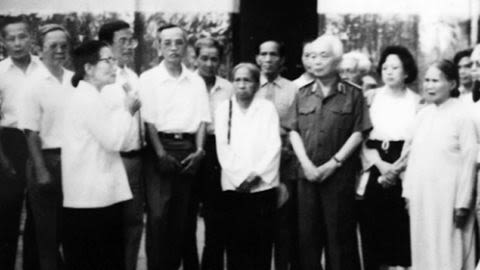
General Vo Nguyen Giap and his daughter Vo Hong Anh with revolutionary soldiers who were imprisoned by the enemy at Hoa Lo Prison (Mr. Nguyen Tien Ha wearing glasses, standing in the middle).
During his time in Hoa Lo, when his health gradually recovered, his will to fight the enemy made him more active than before. His resilience and courage made his brothers in prison respect him, and he was elected Secretary of the Party Cell of Hoa Lo Prison.
“The directive of the Hanoi Party Committee was to turn prisons into revolutionary schools to fight against the enemy, as a new front. To liberate the nation, to make a revolution, first of all, we must have knowledge and education,” Mr. Ha said, then talked about the time he organized classes in prison.

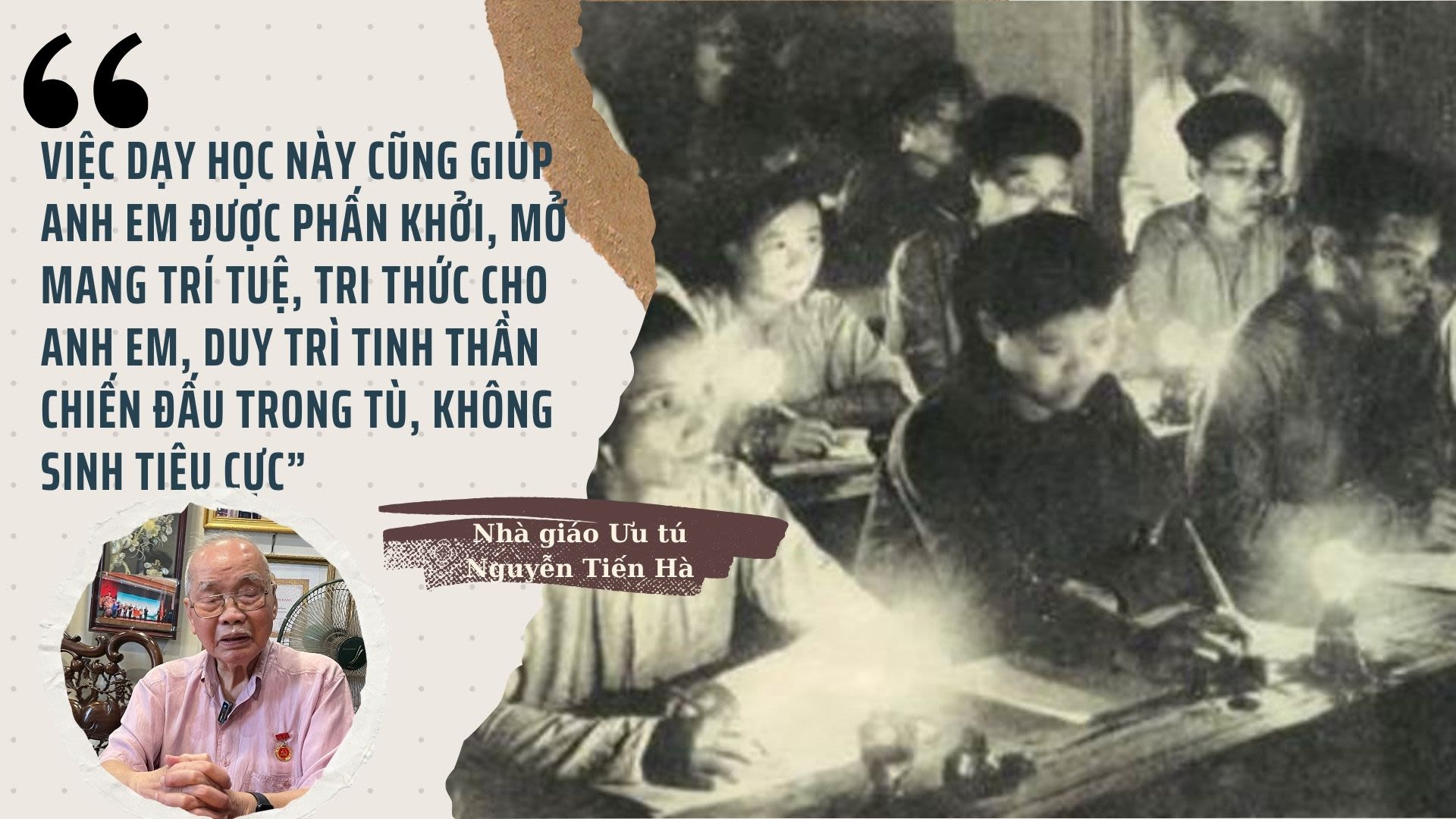
Despite being under strict house arrest, in Hoa Lo, he took advantage of every second and every minute to secretly teach writing, eradicate illiteracy, teach the brothers addition, subtraction, multiplication and division; and give a brief history lesson. Whoever had the ability, he taught. Mr. Ha taught the national language, English, and French. The comrades working at the Fatherland Front taught theory, helping illiterate people improve their level so that after being released from prison, they could continue to serve the government and the people.
"This teaching also helps the brothers to be excited, broaden their intelligence and knowledge, maintain their fighting spirit in prison, and not create negativity," said Mr. Ha.
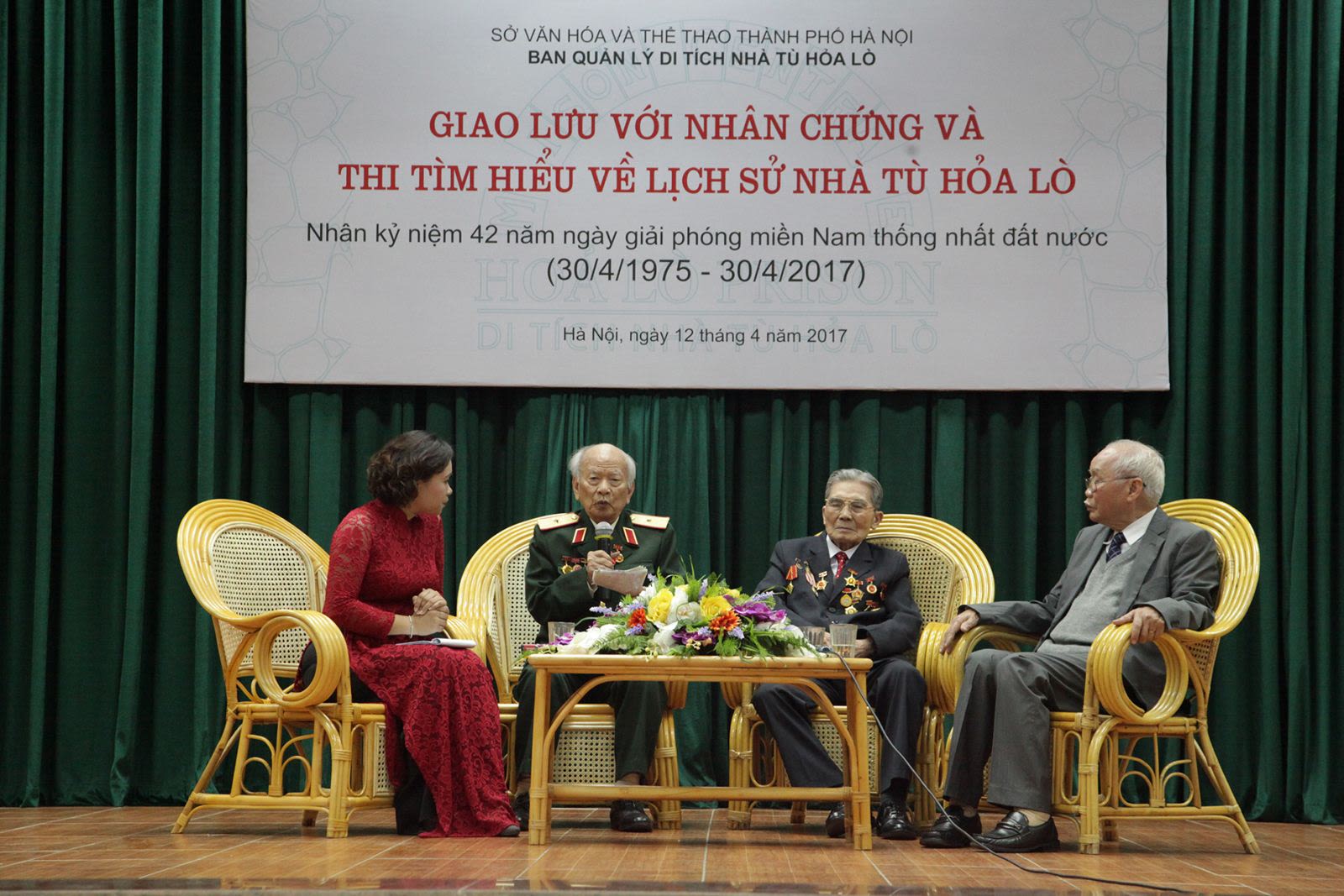
Mr. Nguyen Tien Ha (far right) in an exchange with the young generation of the capital.
Taking advantage of the time, he and some comrades also wrote internal newsletters and newsletters sent from outside the District Party Committee, summarizing information for the camps so that the camps could report news about their own camps.
“It was very difficult to write the newsletter, we had to have supplies from outside such as thin cellophane paper, carbon paper, and pens. These items were secretly sent in through soldiers who were infiltrated to work as organizers in the prison office, hidden in rice boxes and had to be delivered personally,” Mr. Ha said.
Regarding the source of information, at first, the news was transmitted through sticky rice and cake wrapping paper. But after 3 months, the enemy discovered it, the source of information was shrunk down, stuffed into a medicine bottle, and smuggled into the prison.
The time spent producing newspapers in prison was also filled with unforgettable memories. Under the dim light of an oil lamp, Mr. Ha and his fellow prisoners crawled out to write newspapers with pencils on thin pieces of cellophane paper, then proceeded to “photocopy” them with carbon paper. Writing and keeping watch, each night they could only produce about a dozen newspapers. During the communal time in the bathing pool, newspapers as big as two fingers were hastily passed around.
In Hoa Lo prison, Mr. Ha and his comrades continued the underground information source of the resistance war, so that the soldiers in the prison would not be cut off from information about the nation's revolution.
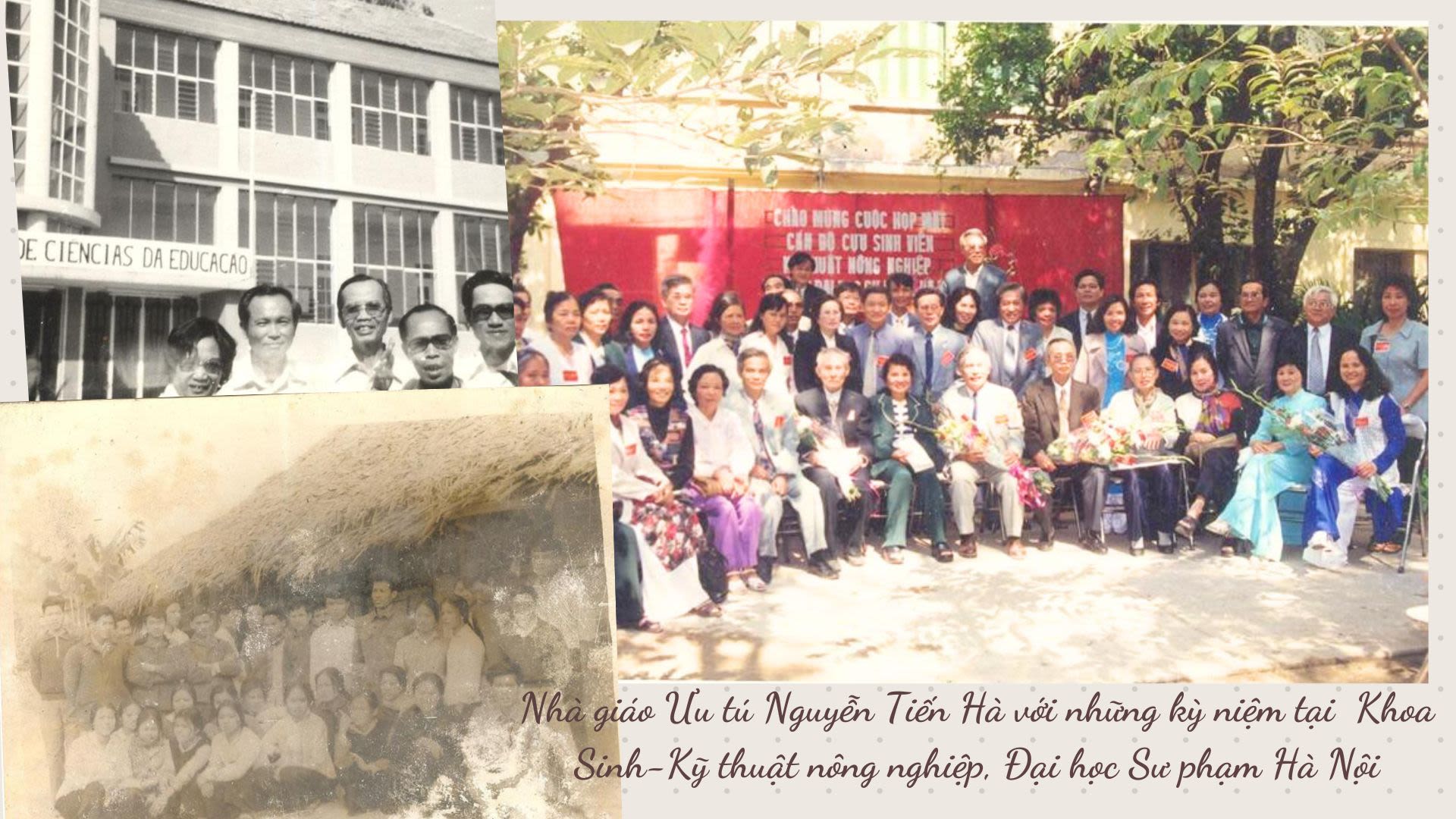
In December 1952, Mr. Ha was released. He continued to lie in wait, operating semi-publicly in Hanoi until the Geneva Agreement was signed, and he was assigned to take over the capital.
Because he knew French, he was assigned to be in charge of the African-European Prison Camp, explaining to African-European prisoners the humanitarian policies of our government.
On October 8, some of our army units returned to hide in the first belt. According to Mr. Ha's memory, at that time, three units openly advanced towards Hanoi through two city gates. "As someone who worked on the spot, I had different deep emotions. I had experienced life and death in prison, so seeing Hanoi free again after so many years, seeing its liberation was very joyful. At that time, I was both happy and sad. Happy for the liberation of the capital, happy for the festival of Hanoi, but sad because I missed my comrades and teammates who sacrificed their lives and could not attend today's takeover ceremony," Mr. Ha emotionally said.
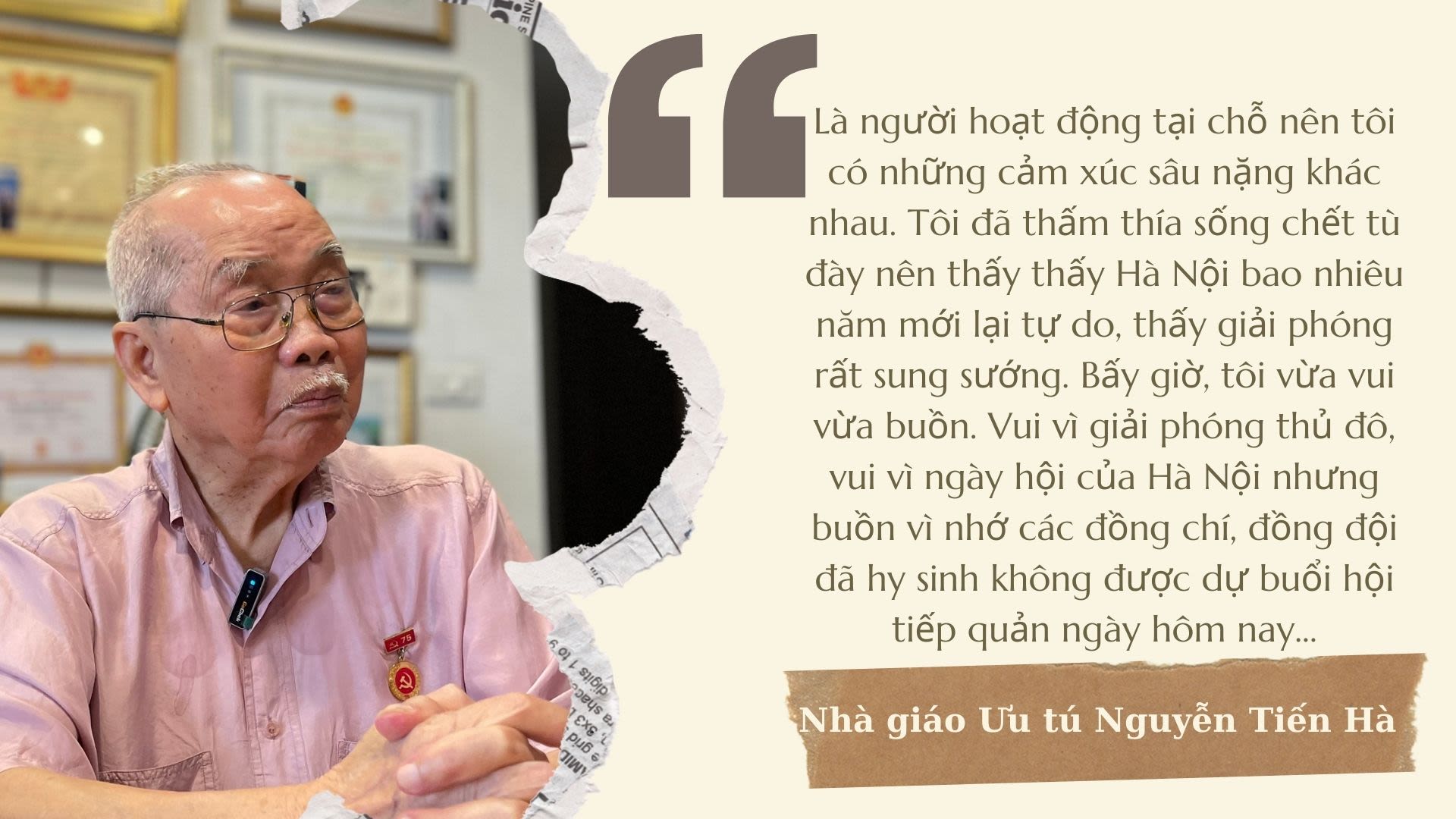
Memories of 70 years ago sometimes make Mr. Ha's shoulders tremble, wiping his tears with a handkerchief. After liberation, he returned to work in the education sector and became a senior expert. He was awarded the title of Excellent Teacher by the State. Currently, he is the Head of the Liaison Committee for revolutionary soldiers who were imprisoned by the enemy at Hoa Lo Prison.
During the historic October days, many young generations came to see him to listen to him. Although his legs were weak and his eyes were dim, he was always willing to welcome the young generations and endlessly talked about the heroic history of the nation, about the steadfast revolutionary soldiers who were brave in the face of enemy torture. Throughout the conversation, he did not consider himself a journalist or a writer, but only a very simple teacher who had contributed a small part to the nation's long-term revolutionary resistance.

Production organization: Nam Dong Content: Thien Lam Presentation: Hanh Vu Photo: VNA, Hoa Lo Prison Relic
Nhandan.vn
Source: https://special.nhandan.vn/ky-uc-ngay-giai-phong-Thu-do/index.html

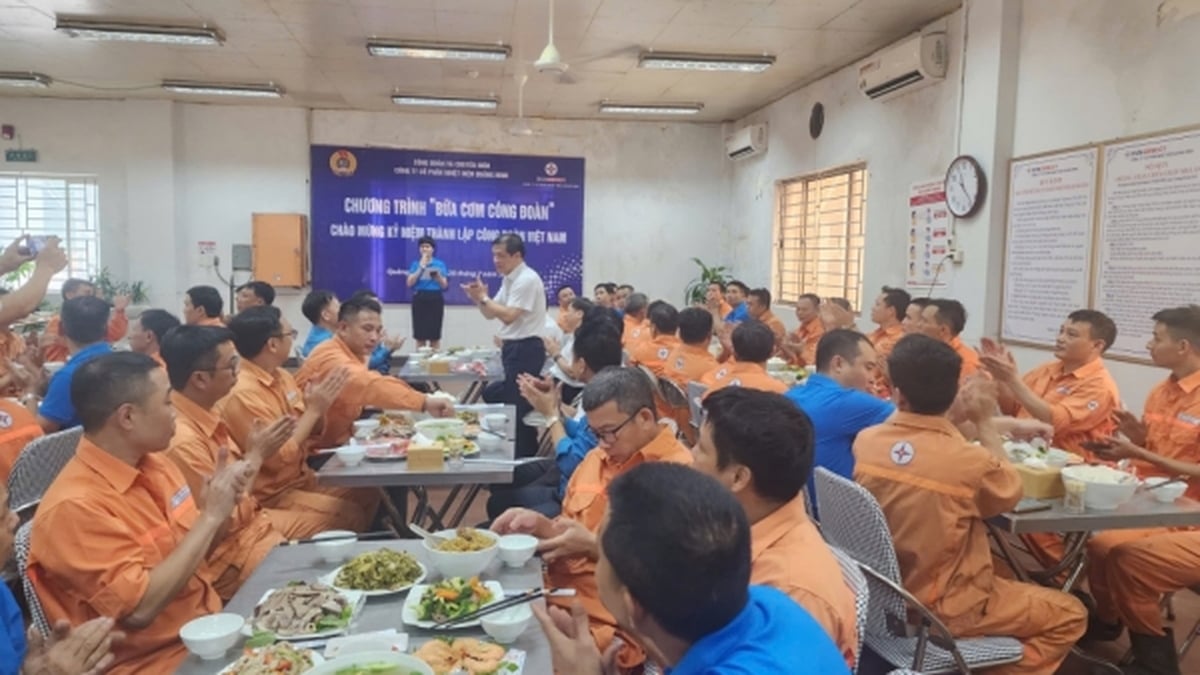
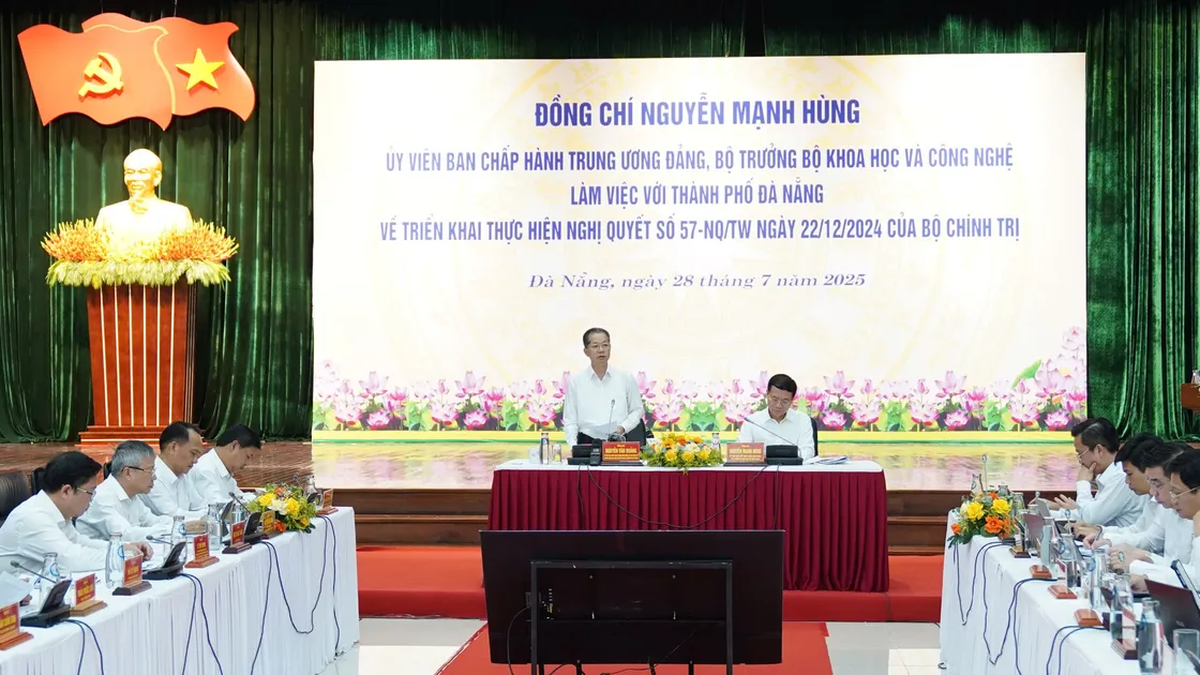
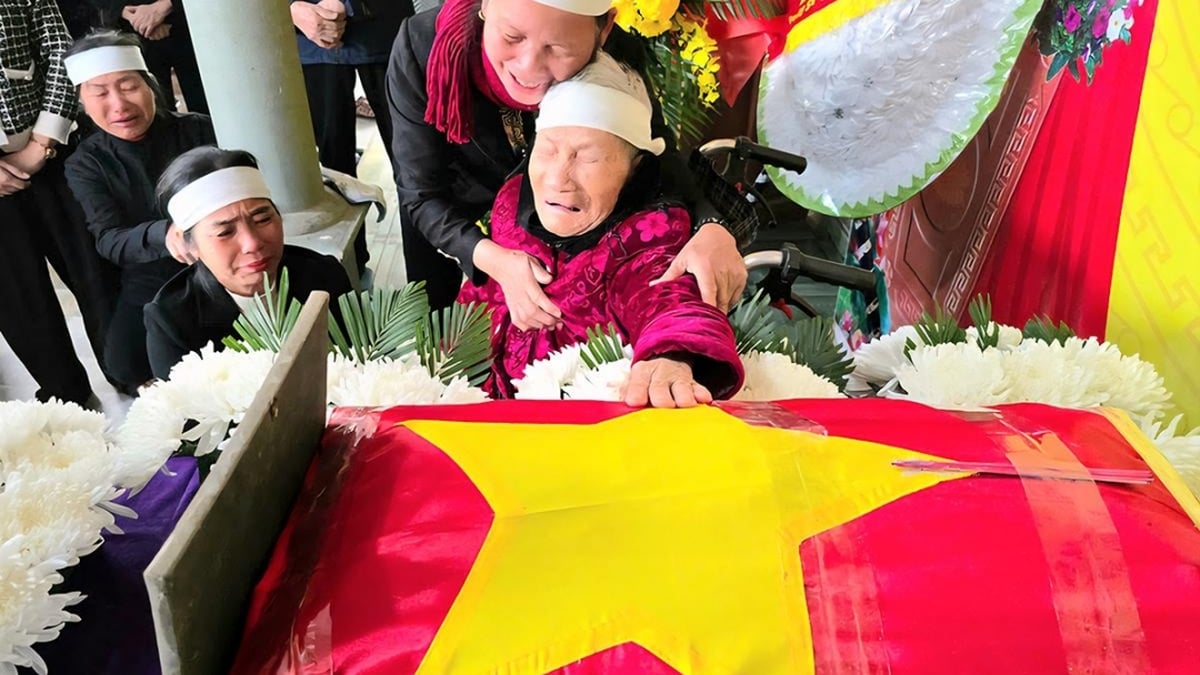
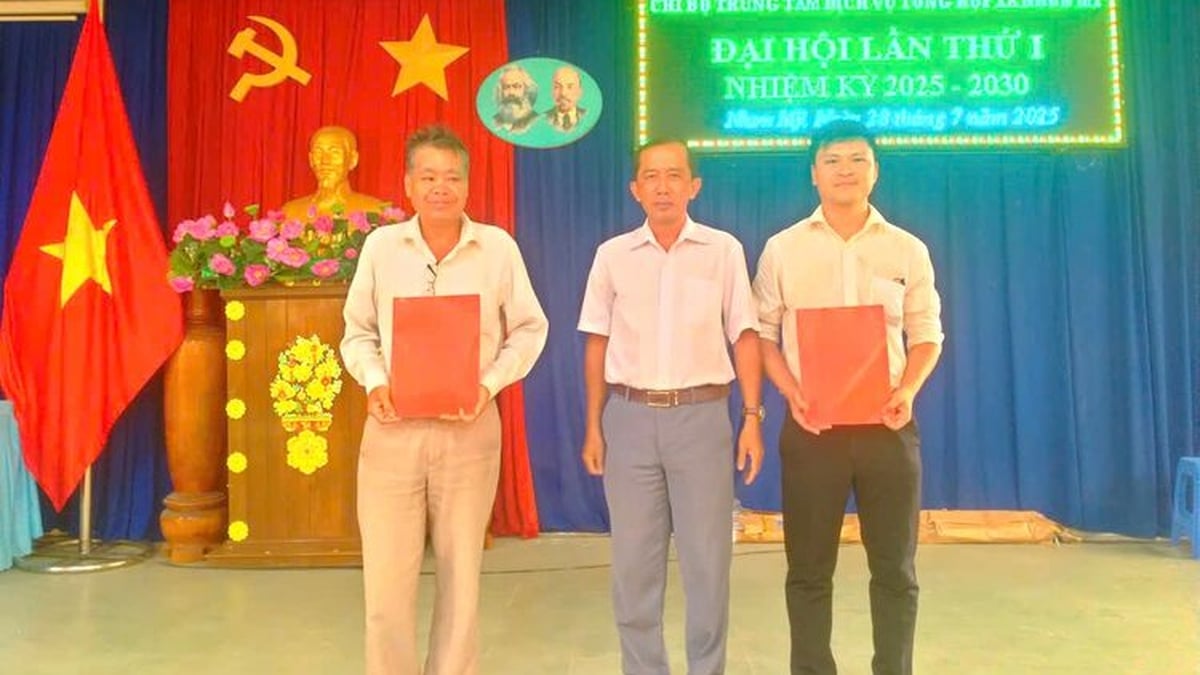
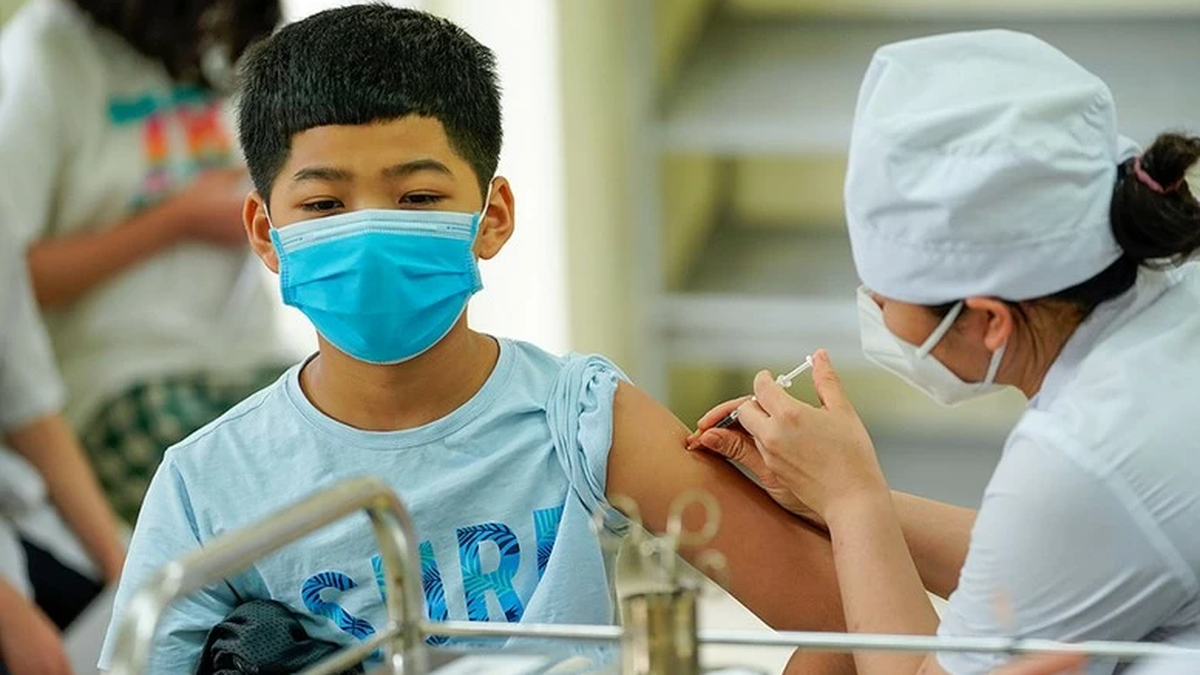
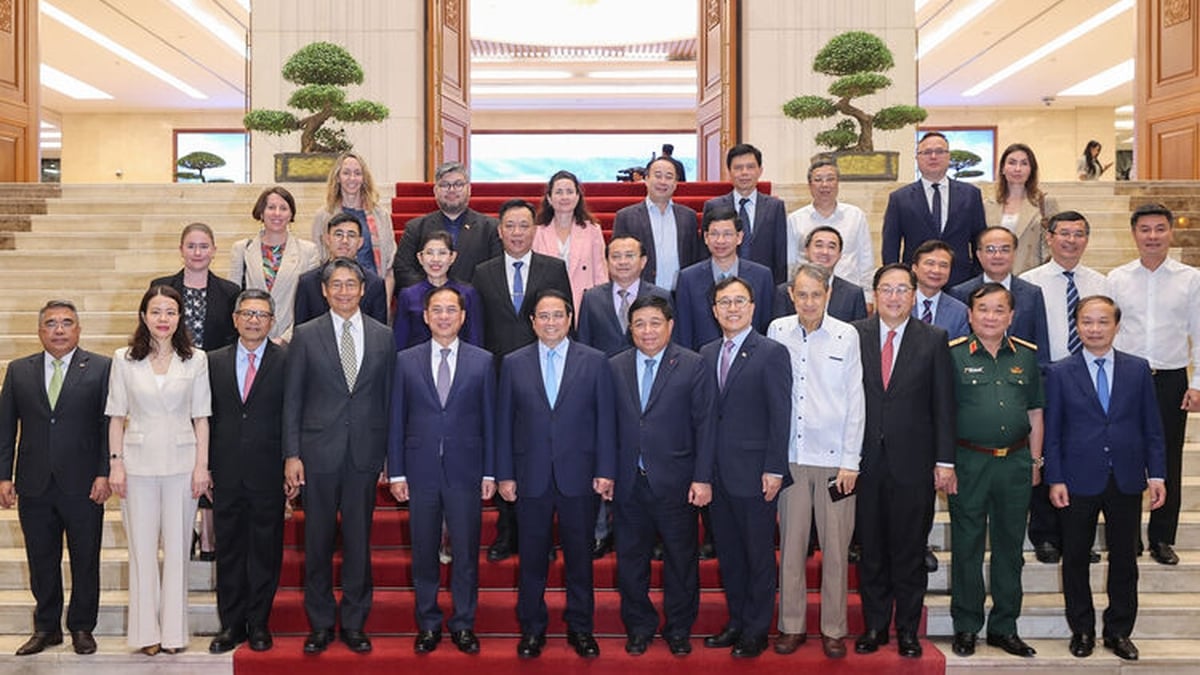
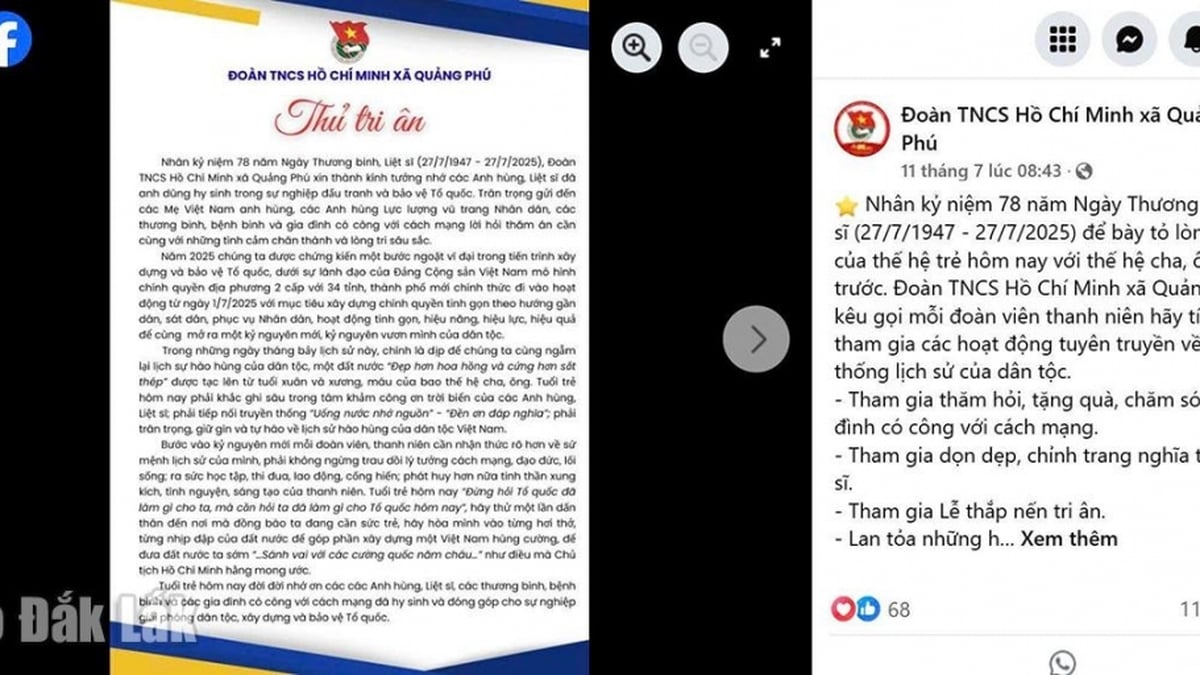
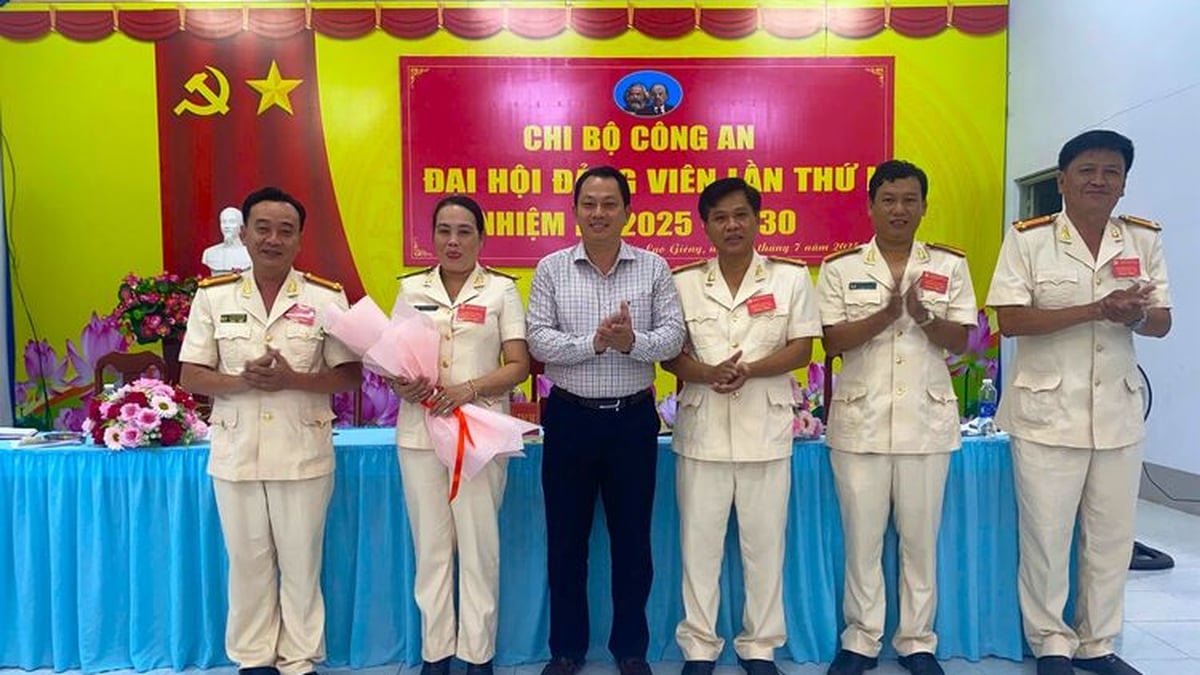
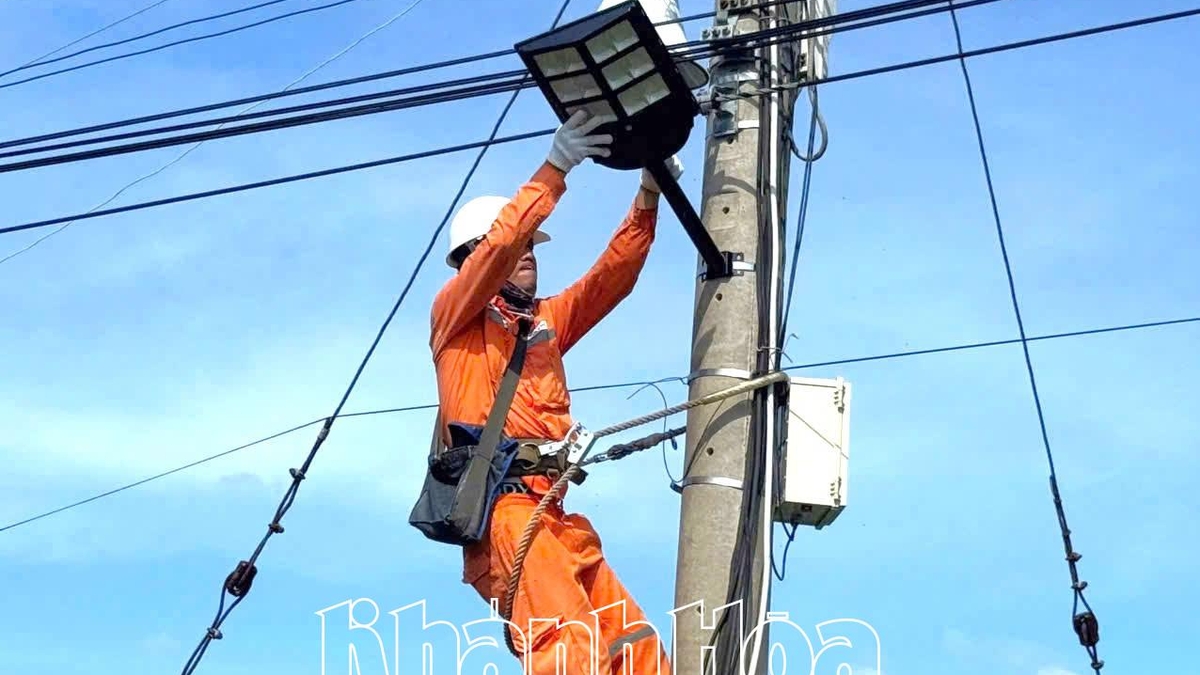
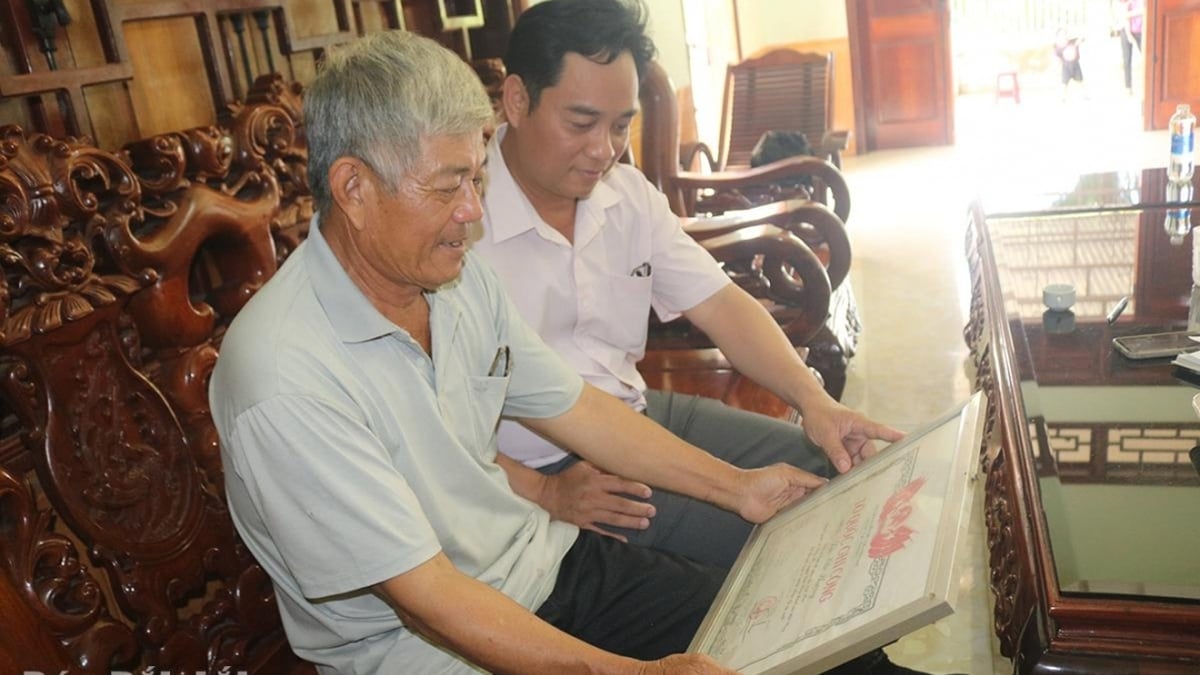











![[Photo] National Assembly Chairman attends the seminar "Building and operating an international financial center and recommendations for Vietnam"](https://vphoto.vietnam.vn/thumb/1200x675/vietnam/resource/IMAGE/2025/7/28/76393436936e457db31ec84433289f72)












































































Comment (0)